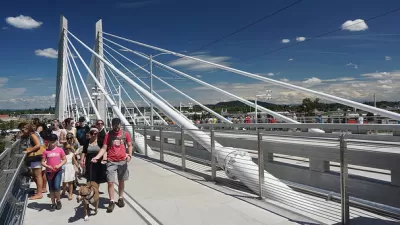A new $135m bridge over the Willamette River will include designated lanes for pedestrians, bikes, and public transit vehicles, but not private cars.
Officials originally contemplated adding space for cars, but found the higher price tag, cumbersome federal design standards and projected traffic impacts forbidding, according to Michael Burnham. The structure is a key component of a 7-mile light rail extension and will be the first of its kind in the U.S. Completion is expected for 2015.
It may surprise some that even in transit-friendly Portland, the project has outspoken critics, writes Burnham:
"San Francisco-based architect Donald McDonald's bridge, more than 1,700 feet long, will feature two 181-foot-tall towers that anchor cables that rise from the river like a sea monster's fins...The Oregonian newspaper dubbed the bridge 'Godzilla on the Willamette' and charged it would 'severely limit' residential development on both sides of the river."
FULL STORY: Who's Scared of a Transit Bridge?

Planetizen Federal Action Tracker
A weekly monitor of how Trump’s orders and actions are impacting planners and planning in America.

Maui's Vacation Rental Debate Turns Ugly
Verbal attacks, misinformation campaigns and fistfights plague a high-stakes debate to convert thousands of vacation rentals into long-term housing.

San Francisco Suspends Traffic Calming Amidst Record Deaths
Citing “a challenging fiscal landscape,” the city will cease the program on the heels of 42 traffic deaths, including 24 pedestrians.

Amtrak Rolls Out New Orleans to Alabama “Mardi Gras” Train
The new service will operate morning and evening departures between Mobile and New Orleans.

The Subversive Car-Free Guide to Trump's Great American Road Trip
Car-free ways to access Chicagoland’s best tourist attractions.

San Antonio and Austin are Fusing Into one Massive Megaregion
The region spanning the two central Texas cities is growing fast, posing challenges for local infrastructure and water supplies.
Urban Design for Planners 1: Software Tools
This six-course series explores essential urban design concepts using open source software and equips planners with the tools they need to participate fully in the urban design process.
Planning for Universal Design
Learn the tools for implementing Universal Design in planning regulations.
Heyer Gruel & Associates PA
JM Goldson LLC
Custer County Colorado
City of Camden Redevelopment Agency
City of Astoria
Transportation Research & Education Center (TREC) at Portland State University
Jefferson Parish Government
Camden Redevelopment Agency
City of Claremont





























